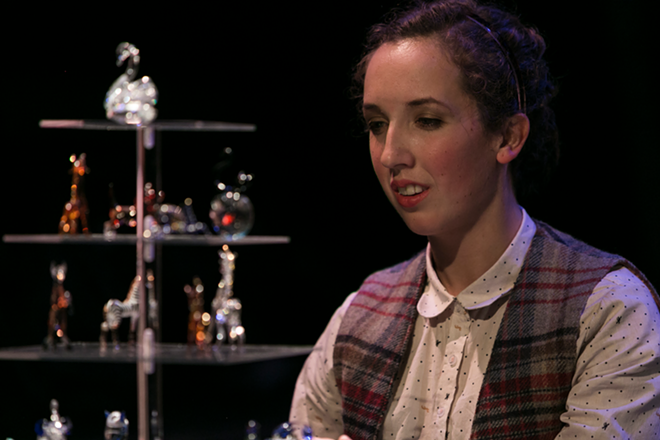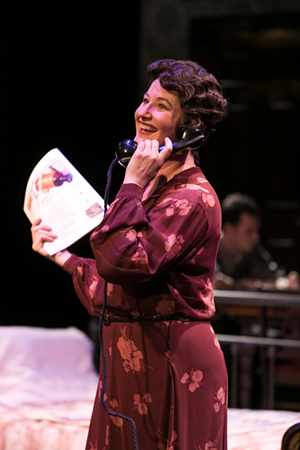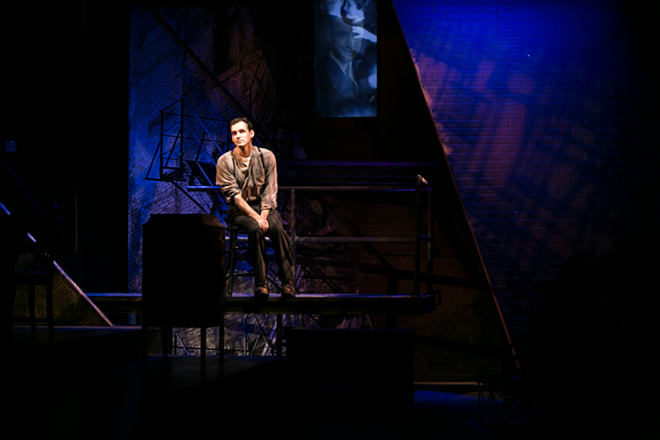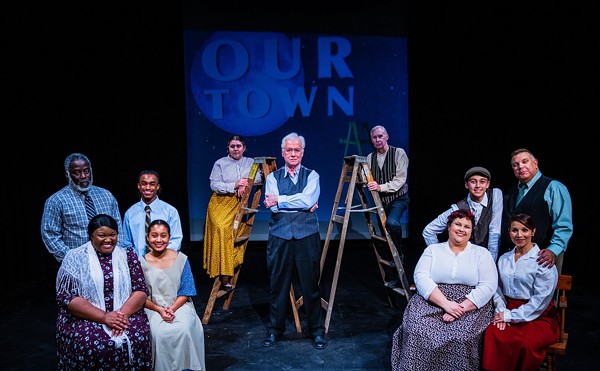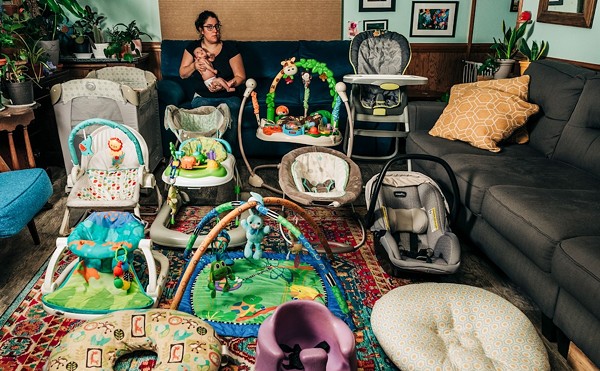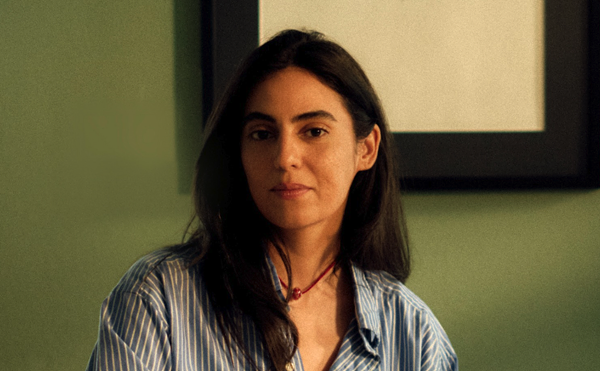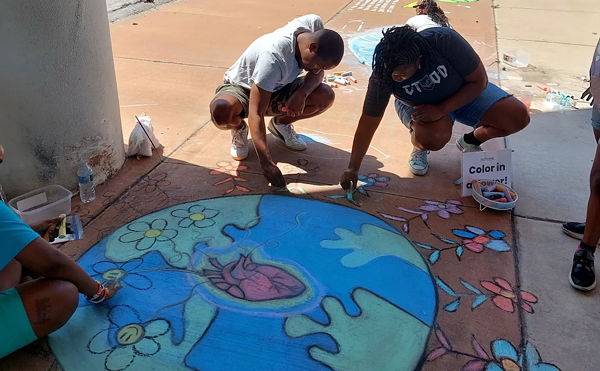The challenge in staging The Glass Menagerie is its familiarity. Walking into freeFall’s black box space (yes, the company’s in its old home again, hooray!), anyone with even a passing knowledge of Tennessee Williams’s memory play will immediately recognize the totems of the beleaguered Winfield family. There’s the fire escape where Tom will smoke and dream of another kind of escape, somewhere far away from this cramped St. Louis apartment, away from his domineering mother, Amanda, and his dead-end warehouse job. There’s the armchair and the telephone where Amanda will make her just-this-edge-of-desperate phone calls trying to sell magazine subscriptions to lady friends. There’s the typewriter where the painfully shy Laura will pretend to practice her skills, and there, most emblematic of all, is her menagerie of glass animals, as fragile as Laura herself. If just the setting alone is etched in playgoers’ memories, how do you make the rest of this 1944 play fresh again?
The answer, it would seem from Eric Davis’s lucid, haunting production, is to do it the way the playwright intended. “The scene is memory and is therefore nonrealistic,” writes Williams in his stage directions, and Davis has found a way of stylizing the action that seems exactly right. As Tom (Robert Glauz) explains to us at the outset, “I am the narrator of the play, and also a character in it.” He not only tells us about his family, Davis has him step in from time to time to arrange them — to adjust their attitudes to fit his memories, perhaps. At other moments, Davis freezes the action to great effect — as when a sudden move threatens Laura’s glass collection and we hear a terrible crashing sound. It’s definitely not realistic — and yet it gets viscerally to the terror of that moment for Laura.
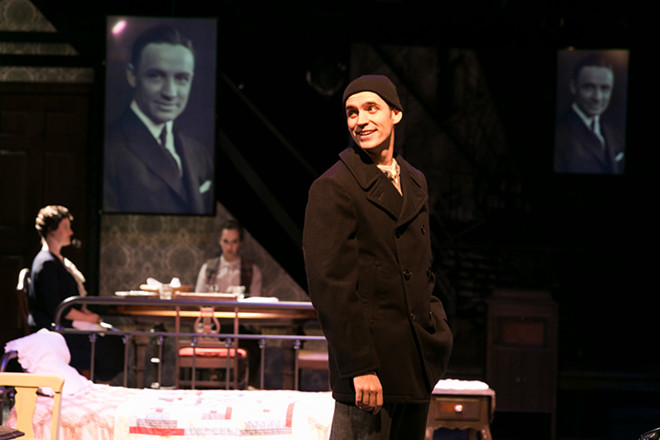
None of this intrudes upon the script; in fact, I think it clarifies it. I don’t think I’ve ever seen a production of Glass in which it was so clear how often the characters are saying exactly the opposite of what they want to say. “Deception!” cries Amanda when she realizes Laura has only been pretending to attend business classes, but everyone in the play is at odds with the truth. There’s a stunning moment when Amanda (Stephanie Lynge), having sat Tom down for an important conversation, tells him she wants to talk about… Laura. And in the weighted pause Lynge takes before she says Laura, we know from all that’s gone before that she really wants to talk to Tom about… Tom.
The play reflects many aspects of Williams’s own life. Tom was his given name; he worked in his father’s shoe warehouse; his sister Rose was psychologically crippled. It’s open to interpretation whether we’re meant to believe Tom when he tells his mother he’s going to the movies, but in this production it’s more than insinuated that Tom’s secrets, like Tennessee’s when he was a young man, have to do with his sexuality. In that fraught moment of confrontation with Tom, Amanda talks about finding a letter he got from “the Merchant Marine,” and earlier she admits having confiscated his copy of “that hideous novel by that insane Mr. Lawrence.” But Davis, in a bit of business that’s not in the script but seems apt, shows us her discovery. Along with the letter, she finds a picture tucked inside the book; projected onto the screen at the rear of the stage, it’s a homoerotic drawing in the style of the artist Paul Cadmus, infamous in the ’30s for his glorifications of the male anatomy.
That visual is subtle, though; nothing's overstated here. Glauz’s soulful-eyed Tom has a more youthful, dreamy affect than some older, more cynical characterizations I’ve seen, but it works, and it aligns him more closely with his sister, a role inhabited with exquisitely awkward grace by Ali Foley. (The family is extremely well-cast; they look and feel like a family, not an easy achievement; they even look believably connected to their absent father, “the telephone man who fell in love with long distance” whose picture is prominently displayed in the apartment.) At one point, Amanda asks Laura to look at herself in the mirror; we have to imagine the mirror, but we see Tom facing her, again stepping into the action as an observer. He is her mirror and she is his, the moment seems to say, and it’s deeply touching.
Both Lynge as Amanda and Michael David as the much-wished-for Gentleman Caller come on strong when we’re introduced to them. That goes with the territory when it comes to the GC; he’s convinced himself that Dale Carnegie speech lessons can help him live up to the promise he showed in high school, when he was the golden boy. But his gentle interaction with Laura is achingly poignant — especially in his genuine regret when he realizes Laura may have expected something more.
I was a bit worried at first that Lynge was bringing too much battleaxe, not enough charm to the character. But as the play progresses, we sense the vulnerability beneath the facade, and in her wistful recollections of multiple beaux we can see the Southern belle she was (even though we’re never quite sure whether her memories are more fantasy than reality).
Davis makes extremely effective use of music, light and video. “In memory everything happens to music,” says Tom. “That explains the fiddle in the wings.” And sure enough, we hear a plaintive violin far away, beautifully modulated by sound engineer Steve Kraack. The screens where we see the images of Wingfield père also bring the outside world in — via newsreels that give a strong sense of the tumult of the ’30s. Frank Chavez’s costumes and Steven K. Mitchell’s set, from Amanda’s “girlish frock” to the intricate network of surrounding fire escapes, bring vital, thoughtful detail.
So how do you make a classic seem new again? Produce it faithfully, sensitively and well.
Revisit The Glass Menagerie. You will be glad to make its acquaintance again.

